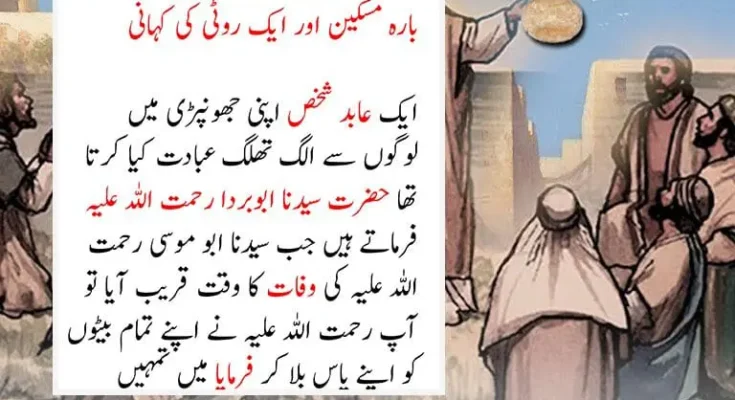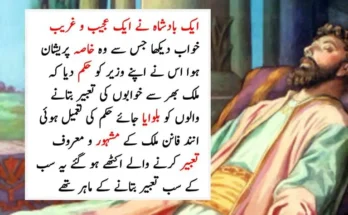In the following tale, we delve into a narrative that reflects the essence of compassion, redemption, and the profound impact of a simple act of kindness. This story serves as a timeless reminder of the significance of extending a helping hand to those in need. Once upon a time, in a humble abode, there lived a devout man who dedicated his life to solitary worship and meditation. His unwavering commitment to seeking spiritual solace set him apart from the ordinary folk. This devout man was none other than the revered Hazrat Abu Barda (may Allah’s mercy be upon him).
READ IN URDU BELOW
بارہ 12 مسکین اور ایک روٹی کی کہانی
ایک عابد شخص اپنی جھونپڑی میں لوگوں سے الگ تھلگ عبادت کیا کرتا تھا حضرت سیدنا ابوبردا رحمت اللہ علیہ فرماتے ہیں جب سیدنا ابو موسی رحمت اللہ علیہ کی وفات کا وقت قریب آیا تو آپ رحمت اللہ علیہ نے اپنے تمام بیٹوں کو اپنے پاس بلا کر فرمایا میں تمہیں صاحب الرغیب یعنی روٹی والے کا قصہ سناتا ہوں اسے ہمیشہ یاد رکھنا پھر فرمایا ایک عابد شخص اپنی جھونپڑی میں لوگوں سے الگ تھلگ عبادت کیا کرتا تھا وہ 70 سال تک اسی جھونپڑی میں رہا اس عرصے میں کبھی بھی اس نے عبادت کو ترک نہ کیا اور نہ ہی کبھی اپنی جھونپڑی سے باہر آیا پھر ایک دن وہ جھونپڑی سے باہر آیا تو اسے شیطان نے ایک عورت کے فتنے میں مبتلا کر دیا اور وہ سات دن یا سات راتیں اسی عورت کے ساتھ رہا سات دن کے بعد جب اس کی آنکھوں سے غفلت کا پردہ ہٹا تو وہ اپنی اس حرکت پر بہت نادم ہوا اور اللہ تعالی کی بارگاہ میں توبہ کر لی اور وہاں سے رخصت ہو گیا وہ اپنے اس فہر پر بہت نادم تھا اب اس کی یہ حالت تھی کہ ہر ہر قدم پر نماز پڑھتا توبہ کرتا پھر ایک رات وہ ایسی جگہ پہنچا جہاں 12 مسکین رہتے تھے وہ بہت زیادہ تھک چکا تھا تھکاوٹ کی وجہ سے وہ ان مسکینوں کے قریب گر پڑا
ایک راہب روزانہ ان 12 مسکینوں کو ایک ایک روٹی دیتا تھا جب وہ راہب باہر آیا تو اس نے روٹی دینا شروع کر دی اور اس عابد کو بھی مسکین سمجھ کر ایک روٹی دے دی اور ان 12 مسکینوں میں سے ایک کو روٹی نہ ملی تو اس نے راہب سے کہا آج آپ نے مجھے روٹی کیوں نہیں دی راہب نے جب یہ سنا تو کہا میں تو 12 کی 12 روٹیاں تقسیم کر چکا ہوں پھر اس نے مسکینوں سے مخاطب ہو کر کہا کیا تم میں سے کسی کو دو روٹیاں ملی ہیں سب نے کہا نہیں ہمیں تو صرف ایک ایک روٹی ملی ہے یہ سن کر راہب نے اس شخص سے کہا شاید تم دوبارہ روٹی لینا چاہتے ہو جاؤ آج کے بعد تمہیں روٹی نہیں ملے گی جب وہ عابد نے یہ سنا تو اس سے اس مسکین پر ترس آیا چنانچہ اس نے وہ روٹی مسکین کو دے دی اور خود بھوکا رہا اور اسی بھوک کی حالت میں اس کا انتقال ہو گیا جب اس کی 70 سالہ عبادت اور غفلت میں گزری ساتھ راتوں کا وزن کیا گیا تو اللہ تعالی کی نافرمانی میں گزاری ساتھ راتیں اس کی 70 سالہ عبادت پر غالب آگئی پھر جب ان سات راتوں کا موازنہ اس روٹی سے کیا گیا جو اس نے مسکین کو دی تھی اور روٹی ان راتوں پر غالب آگئی اور اس کی مغفرت کر دی گئی سیدنا ابن مسعود رضی اللہ عنہ سے یہی حکایت اس طرح مروی ہے کہ ایک عابد نے 70 سال تک اللہ ازوجل کی عبادت کی پھر اس نے ایک فاحشہ عورت سے گناہ کیا اللہ عزوجل نے اس کے تمام اعمال ضائع کر دیے پھر جب اسے اپنے گناہ کا احساس ہو گیا تو وہ تائب ہو گیا کچھ دنوں کے بعد اسے ایسی بیماری لاحق ہو گئی کہ وہ چلنے پھرنے سے محصور ہو گیا ایک دن اس نے دیکھا کہ ایک شخص روٹیاں تقسیم کر رہا ہے گرتے پڑتے یہ بھی وہاں پہنچا اور اس نے بھی ایک روٹی حاصل کر لی ابھی اس نے روٹی کھانا شروع بھی نہ کی تھی کہ اس سے ایک مسکین نظر آیا چنانچہ اس نے وہ روٹی مسکین کو دے دی اور خود بھوکا ہی رہا اللہ عزوجل کی بارگاہ میں اس کا یہ عمل ایسا مقبول ہو گیا کہ اس کی یہ مغفرت کر دی گئی اور اسے 70 سالہ عبادت کا ثواب بھی لوٹا دیا گیا
کہتے ہیں کہ انسانیت اللہ پاک کا کنبہ ہے جو انسانیت کا دوست وہ اللہ پاک کا دوست اور جو انسانیت کا دشمن وہ اللہ پاک کا دشمن ہے اللہ فرماتا ہے کہ میری ذات ایسی ہے کہ میں زمینوں اور آسمانوں میں نہیں سما سکتا پھر فرماتا ہے کہتا ہے کہ مجھے تلاش کرنا ہو تو مومن کے دل میں تلاش کرو میں وہیں پر رہتا ہوں کیا آپ نے سوچا ہے کہ جب اپٹ کسی کا دل دکھاتے ہیں دراصل میں آ پ اللہ پاک کو ناراض کرتے ہیں اور جب آپ اپنے عمل سے کسی کا دل خوش کرتے ہیں کسی کی مدد کرتے ہیں انسانیت کے کام آتے ہیں انسانوں کا خیال رکھتے ہیں تو اللہ پاک کتنا خوش ہوتا ہوگا کیونکہ وہ اپنے بندوں سے بے تحاشاہ محبت کرتا ہے یقینا نمازوں حج عمرہ اور دیگر عبادات کا بہت بڑا ثواب ہے لیکن اگر اثپ نے کسی کا دل دکھایا اگر اثپ نے اللہ پاک کے انسانوں کا دل دکھایا تو آپ کی تمام تر عبادات ضائع کر دی جائیں گی کیا ہی اچھا ہو کیا آپ عبادت کے ساتھ ساتھ انسانوں کا خیال رکھیں غریبوں مسکینوں کا خیال رکھیں اللہ پاک آپ سے کتنا راضی ہوگا۔
As the time approached when Hazrat Abu Musa (may Allah’s mercy be upon him) departed from this world, he summoned all his sons to his side. He had a profound message to impart to them, one that would resonate through the ages. “I shall narrate to you the story of ‘Sahib al-Raghib,’ the Bread Giver. Remember it always,” he said.
The tale unfolded with the introduction of an ascetic who had secluded himself in a hermitage, diligently engaging in worship for an astonishing seventy years. Throughout this period, he had never once abandoned his devotion or ventured beyond the confines of his dwelling. It was a remarkable display of unwavering commitment.
One fateful day, however, the hermit stepped outside his hermitage. As he emerged from his self-imposed isolation, he encountered a woman who was embroiled in a grave moral dilemma. She had fallen prey to the snares of temptation, ensnared by a wicked temptation, and had spent seven consecutive nights in her company.
Overwhelmed by a sudden rush of remorse, the hermit rushed back to his sanctuary, consumed by deep regret for his actions. He prostrated before Allah in profound repentance, seeking His forgiveness. The gravity of his repentance was matched only by the depth of his remorse. And Allah, in His infinite mercy, accepted his repentance, wiping clean the slate of his past.
With his devotion renewed, the hermit began offering prayers with every step he took. It was a stark departure from the hermit who had secluded himself for seven decades. His transformation was so profound that it captured the essence of his newfound humility and devotion.
One evening, the hermit reached a place where twelve indigent individuals resided. These twelve souls were under the care of a compassionate ascetic who distributed a loaf of bread to each of them daily.
Upon seeing this act of charity, the reformed hermit was deeply moved. He approached the ascetic and requested a loaf of bread for himself. The ascetic, unaware of the hermit’s extraordinary journey, granted his request and offered him a loaf of bread.
The hermit, out of sheer gratitude and humility, approached one of the needy individuals and shared his loaf of bread with them. However, he remained hungry, choosing to forgo his own meal.
The ascetic observed this act of selflessness and approached the hermit, inquiring whether he had received two loaves of bread by mistake. The hermit responded with a simple question, “Have any of you received two loaves of bread today?” All twelve individuals replied in unison, “No, we have received only one loaf each.”
With this confirmation, the hermit continued to fast, and his actions were driven by a deep sense of humility and gratitude for Allah’s mercy. His act of sharing, even in his hunger, was a demonstration of his commitment to the path of righteousness.
The story of “Sahib al-Raghib” or the Bread Giver illustrates the profound impact of a simple act of kindness and the transformative power of genuine repentance. It serves as a reminder that acts of compassion and care for fellow human beings hold a special place in the eyes of Allah. While acts of worship and devotion are undoubtedly important, the human heart, moved by empathy and kindness, can achieve a level of spirituality that transcends rituals.
In conclusion, this story reminds us of the value of humanitarian deeds and how they resonate with the core principles of faith. As the saying goes, “The best among you are those who benefit others.” May we all be inspired by the tale of the Bread Giver to extend our helping hands to those in need, embodying the true essence of compassion and empathy.
Please note that the story is a parable, and its focus is on the moral and spiritual message it conveys rather than a specific historical account.






